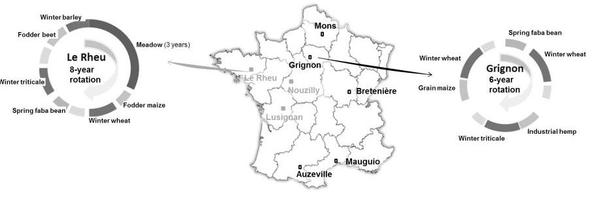Europe
June 16, 2014

France's Res0Pest experimental network marks a new way of producing the knowledge required to design environmentally friendly cropping systems, testing complete systems rather than individual factors and dispensing with all pesticides, both synthetic and those permitted in organic agriculture. Team members Vincent Cellier, Caroline Colnenne-David, Violaine Deytieux and Ségolène Plessix explain more:
In 2011, the INRA-CIRAD Integrated Pest Management Network IPM-Net set up a ground-breaking network of pesticide-free arable cropping systems experiments in France named Res0Pest. The aim is to gain a better understanding on how to design cropping systems inherently less reliant on pesticides. The network will identify technical barriers, test alternative techniques and gain knowledge on agronomic practices and biological regulation of populations to improve the management of pests.
The Res0Pest experimental network will:
- Design and test cropping systems under the constraint of using no pesticides (in other words, no synthetic plant protection products nor products such as copper and sulphur), and assess their agronomic, environmental and socio-economic performances.
- Study the effects of pesticide-free cropping systems on pest populations with a particular eye on natural biological regulations.
The network includes eight long-term experiments implemented in INRA experimental units and one agricultural high school, in different production situations in France (see Figure 1).

Figure 1. Res0Pest sites in France and two examples of crop sequence of pesticide-free cropping systems tested in Le Rheu (Brittany), and Grignon (Ile de France). Sites related to mixed systems are in grey; sites related to arable crop systems in black (click to enlarge).
All the cropping systems under consideration were adapted to their regional production situation, taking into account soil and climate conditions, social and economic drivers and local concerns. Nevertheless, they were all designed according to a common set of constraints and objectives:
- Constraints: no pesticide use (except for biopesticides) and cultivation of the major crops in the region under consideration.
- Objectives: to maximise, under these constraints, crop production (yield quantity) satisfying market specifications (yield quality) while (i) reducing other environmental impacts such as fossil energy consumption and greenhouse gas emissions and (ii) maintaining economic profitability for farmers.
In this network, the tested cropping systems were designed using IPM principles and combine different techniques in order to limit pest damage and to benefit from biological regulation, as proposed by Attoumani-Ronceux et al., 2011. For example, biological diversity is enhanced by diversifying crop sequence (Figure 1), or by associating several species or cultivars in a same field.

Mechanical weeding is among the techniques being used in combination. Copyright: INRA
Many other techniques are combined in the systems, for example, sowing date and rate, false-seed bed tillage, mechanical weeding etc. The field margins, such as grass or flower strips, and landscape features are also taken into account.
All the field experiments started in autumn 2012, except for one located in Grignon, which started in spring 2008 and is contributing to the PURE project - it is one of the four systems assessed in the 'Innovative Cropping systems under Constraints' long-term field trial (Colnenne-David and Doré, submitted). For all experiments, the plot area is at least 0.5ha, in order to mirror commercial fields. Fifty per cent of crops in the rotation are tested every year.
Over the course of the first two years of experiments, those involved have shared their experiences, contributing to both an improvement in their technical knowledge on pesticide-free cropping systems and their monitoring skills. Another important step has been the production of a set of protocols in order to standardise data collection. This makes it possible to evaluate experimental cropping systems and compare them across the network.
Some specific protocols are being written to characterise pest injury levels and the establishment of biological regulation, in connection with another specific project. These protocols are shared more widely through the QuantiPest platform.
While it's too early to produce suggestions for farmers and offer conclusive evidence on long-term and cumulative effects, the data collected can be used for modelling purposes. The protocols developed are a valuable methodological result of the network.
The challenge in the coming years is to initiate and develop new collaborations in order to take full advantage of this unique experimental support.
Acknowledgements
This project is funded within the Ecophyto French National Plan, under the DEPHY-EXPE programme (Res0Pest Project). We thank all experimenters of the Res0Pest network. We also thank the 'Innovative cropping systems' Joint Network of Technology for methodological exchanges.
For more information:
References
Attoumani-Ronceux, A, Aubertot, J-N, Guichard, L, Jouy, L, Mischler, P, Omon, B, Petit, M-S, Pleyber, E, Reau, R, Seiler, A: 2011. Guide pratique pour la conception de systèmes de culture plus économes en produits phytosanitaires. Application aux systèmes de polyculture. Ministères chargés de l’agriculture et de l’environnement, RMT Systèmes de culture innovants. English version, 2013.
Colnenne-David, C.- Doré, T.: Designing innovative productive cropping systems with quantified and ambitious environmental goals. Paper submitted in Renewable Agriculture and Food Systems .